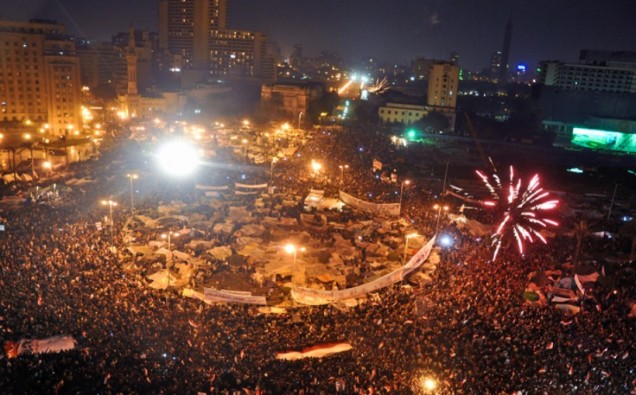
Five yeas ago Egyptians launched the Arab Spring uprising on January 25, when, inspired by the Tunisian demonstrations, men and women from almost all segments of the society raised their full throttle but mostly peaceful demand for an end to Hosni Mubarak’s decades-old strongman rule.
While the historic 2011 convergence of desire for democracy on Cairo’s Tahrir Square ousted Mubarak, five years later Egyptians are nowhere near the goal of having a genuine participatory and pluralist democracy.
Far from it, illiberalism of some secular and liberal forces and control of the deep military establishment have rolled back several of the hard-earned democratic gains. The elected Muslim Brotherhood government, which was also to blame for its power grab, was dismissed in coup d’état in 2013.
Since then, thousands of young people seeking freedom and economic opportunity have been killed extrajudicially and jailed for the crime of standing up to the rule of former army chief Abdul Fatah al Sisi. The sweeping victory of pro-Sisi ‘For Love of Egypt’ party in 2015 Parliamentary elections has made a mockery of the democratic dispensation.
The election of the rubber stamp Parliament was not only a setback for democratic plurality it also reflected the Egyptian youth’s despair in the face of continued authoritarianism. The 22 percent voter turnout in the parliamentary polls contrasts sharply with 62 percent in 2011 elections.
In fact, many human rights activists say killings of protestors and draconian laws stifling freedom of expression and the media have pushed Egypt back to a pharaoh-like iron-fist rule of intolerance.
“The level of repression now is significantly higher than it was under the Mubarak regime, and people from older generations say it is worse than even the worst periods of the 1950s and 1960s [under the rule of Gamal Abdel Nasser],”journalist Hossam Bahgat told The Guardian newspaper.
Under the current regime several journalists including an Al-Jazeera international crew were put behind bars and paraded in cages in the courts in a blatant disregard for international norms and calls for freedom of expression.
While Egypt has not spiraled down the cataclysmic path Syria, Iraq, Libya and Yemen have gone, the largest Arab country with a population of more than 80 million has been turned into an Orwellian totalitarian regime. The 2011 Arab Spring fervor for democracy in the country and peaceful demonstrations by its educated jobless youth had a special meaning for democratic transformation in the entire Middle East. Many analysts believe a continued advancement of democracy through free and fair elections could have cast a snowball Arab Spring effect in terms of broad-based governance equitable development of the people, and fight against militancy and terrorism.
Now, five years later the country faces the same old one-man rule. Having concentrated powers in his hand and brutally suppressed dissent with untold number of political imprisonments, Sisi has lately also started using religion to advance his case for rule.
As noted in a New York Times report, last week a preacher invoked religious edicts to boost Sisi after December 2015 Parliamentary election, asking people on state TV to “obey those in authority, specifically the highest authority,” and referred indirectly to Sisi as “God’s shadow on earth.”
This raises fears that if the current Cairo regime faces widespread protests, it might increasingly clamp down on the people and resort to more and more use of religion to quell political opposition.
In fact, Sisi’s tactics prompt comparisons with two very different countries with different circumstances, geographical locations and backgrounds – Pakistan under Zia ul Haq, who used religion to legitimize his dictatorship in 1980s and suppressed democratic forces, and Iran, where a theocratic regime has turned the Persian Gulf country into a militant state that backs violent armed proxies in several Middle Eastern countries.
Consequently, in both Pakistan and Iran cultural diversity, freedom of expression and dissenting democratic voices have been the biggest targets since the late 1970s as forces espousing radical ideologies have exploited the gaps to spread their influence. Almost four decades on, moderate and progressive voices in both countries find it extremely hard to defeat the parochial mindset, although Iranians have higher literacy rates and are heir to creative arts achievements, and although Pakistani civil society has retained some of the vital democratic signs, and experienced peaceful transition of elected governments.
On the eve of January 25 anniversary, Cairo is using all kinds of restrictions to discourage demonstrations on a day that symbolizes an important early Arab Spring milestone but now also represents Egyptians’ unrequited desire for democracy. How long the Egyptians – who have a large educated and progressive youth – would have to live under the dictatorial rules without enjoying basic democratic rights depends on how the world capitals treat Cairo, which holds a vital significance for stability of the region vis-a-vis Israel-Palestinian truce. Meanwhile, multiple conflicts in the Middle East, the rise of ISIS or Daesh, ongoing geopolitical shifts, and autocratic oil-rich Gulf Arab countries’ support for the current Egyptian regime have complicated international calculations in reacting to Cairo’s reign of repression. Some analysts claim that both the Arab powers and Israel oppose democratization of Egypt fearing that might lead to changes in Cairo’s policy on wide-ranging issues including Gaza, where civilians have suffered due to both blockade and Israeli-Hamas conflict.
So how do Egyptians’ overcome this combined challenge of totalitarian rule at home and geopolitical fears abroad as they struggle to keep their democratic hopes alive? Understandably, the world capitals do not want to see another state collapse amid ISIS terror and conflicts in the Middle East but should Cairo be allowed to go on flagrantly violating basic rights in the name of superficial stability?
In the long run, Cairo and the region’s hopes for stability and progress depend on empowerment of Egyptians who largely staged peaceful demonstrations, used creative arts and social media to express their democratic aspirations and want a fair economic opportunity to succeed.












